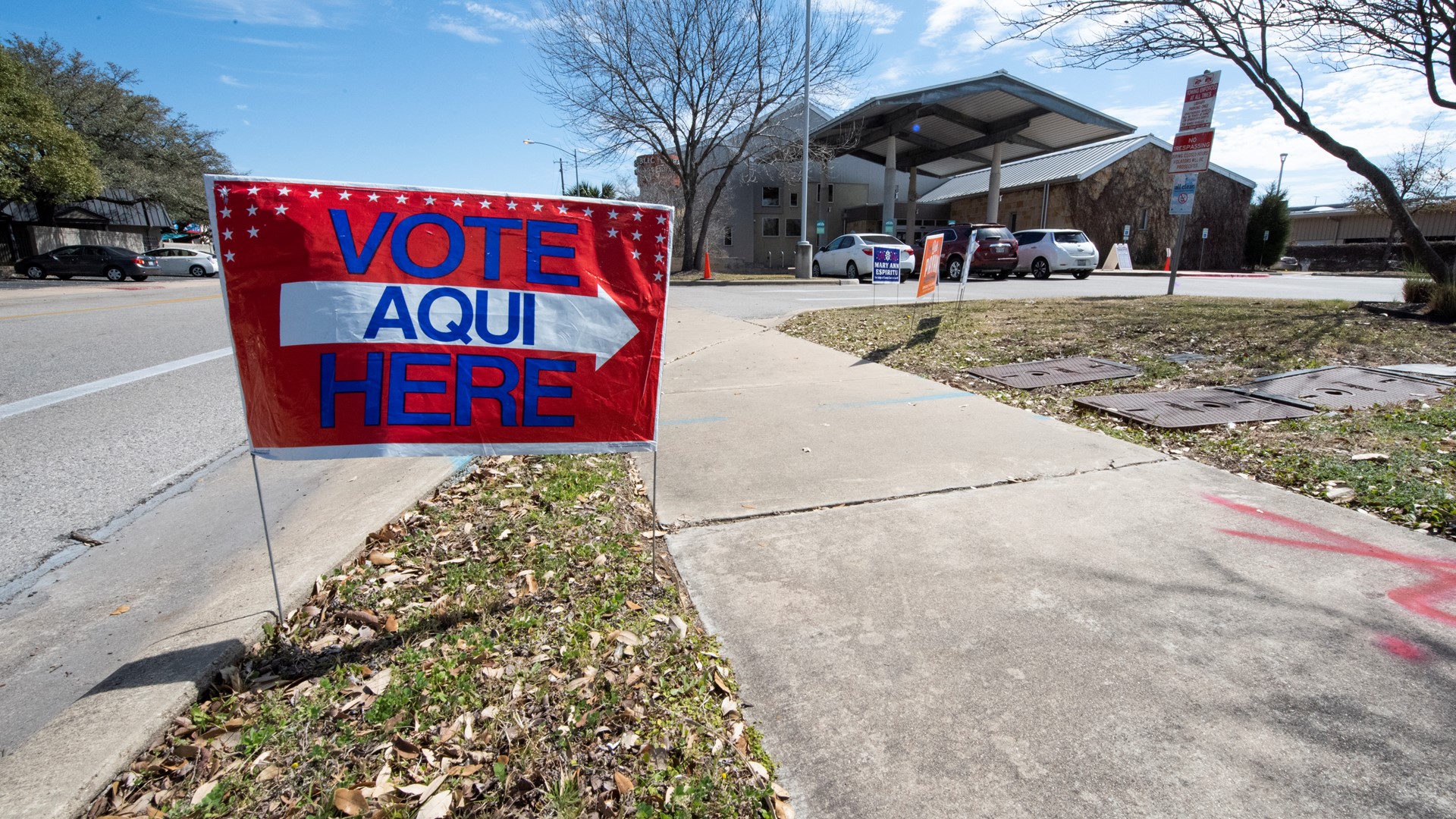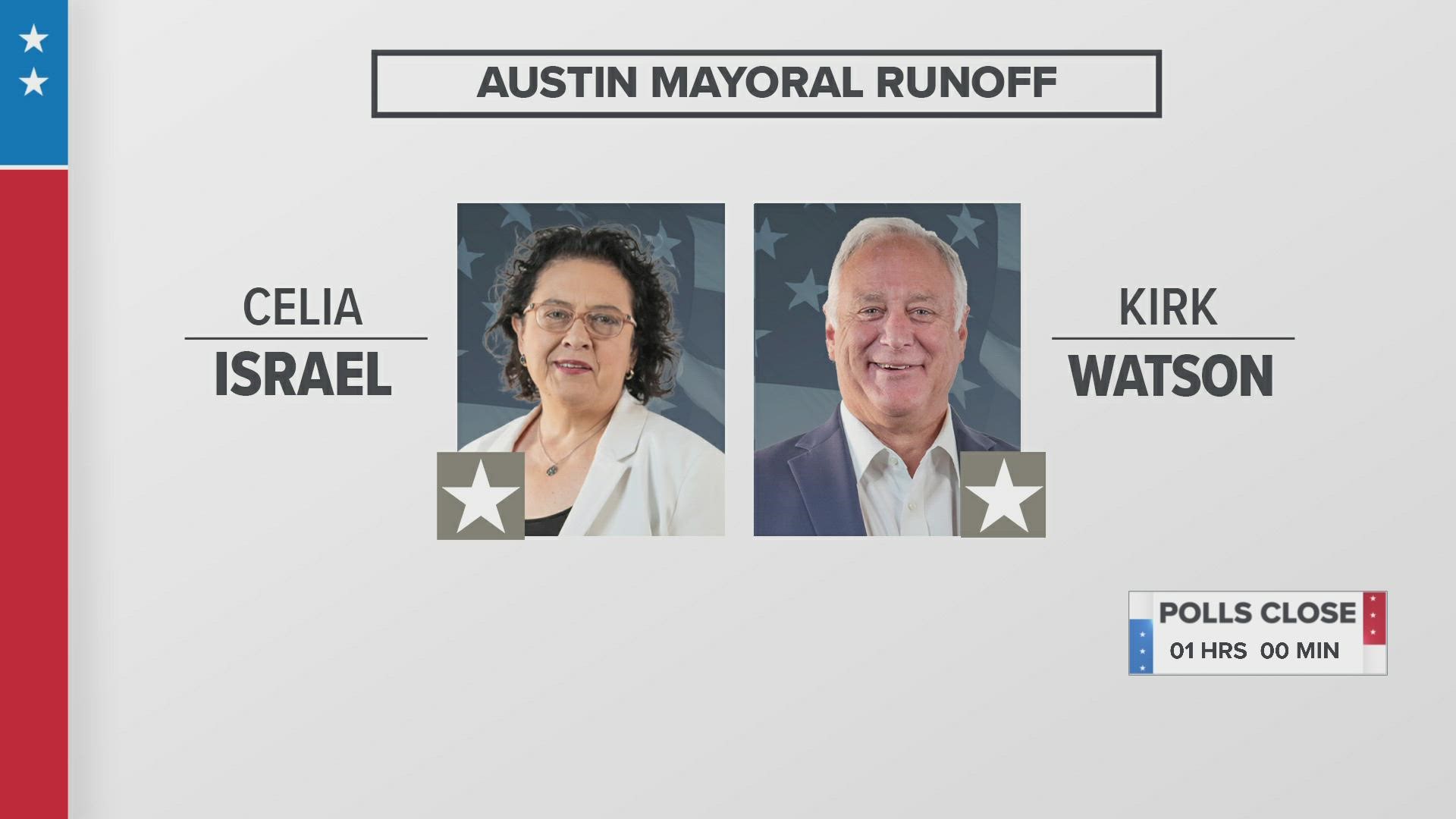Austin runoff election voter guide: What you need to know to vote this December
Here is everything you need to know to vote in the mayoral and city council runoff elections.

Neither Kirk Watson nor Celia Israel received more than 50% in the Austin mayoral election, forcing a runoff. The same is true for the District 3, 5 and 9 city council seats.
Early voting for the runoff election ended on Friday, Dec. 9. Election Day is Tuesday, Dec. 13.
Here is everything you need to know about voting in the election, from polling locations to what you may see on your ballot.
What will be on the ballot?
Austin mayor
None of the six candidates vying for the city’s top job in November received more than 50% of the vote, forcing a runoff election between the top contenders. Former Austin mayor and state senator Kirk Watson and State Rep. Celia Israel will now face each other again in December.
Watson previously served as mayor of Austin from 1997 until 2001. In 2002, he ran for Texas attorney general and lost to Greg Abbott.
Watson spent 13 years in the Texas Senate, to which he was elected from 2007 to 2020 before he retired to become the first dean of the University of Houston’s Hobby School of Public Affairs. He announced he would make his return to politics and again run for mayor of Austin in February of this year.
Watson graduated from Baylor University and ranked first in his class at Baylor Law School, according to his campaign website.
On his site, Watson says that his experience leading Austin for just over four years, in addition to his time in the Texas Legislature, proves that he is “successful in getting things done and creating transformational change.” His main priorities include the city’s rising cost of living, homelessness, systemic racism and transportation.
According to her campaign website, Celia Israel has been an Austinite since 1982. She graduated from the University of Texas and served former Gov. Ann Richards’ administration before becoming a realtor. She later became a member of the Texas House of Representatives, where she has represented the Austin area since 2014.
Israel first said she was considering a run for Austin mayor in September 2021, but she made her official campaign announcement in January of this year.
On her website, Israel pledges to be a “mayor for ALL of Austin” and says that the city “deserves a mayor who works for the people who live here and who build the city around us: our teachers, construction workers, students, public service workers, artists, musicians, technologists, developers and so many more.” Her main issues including addressing the city’s affordability, mobility and public safety challenges, as well as prioritizing reproductive rights and sexual health.
Due to her mayoral campaign, Israel did not run for reelection for Texas House District 50.
To help voters make an informed decision at the polls, KVUE hosted a debate between Watson and Israel on Monday, Dec. 5.
Austin City Council – District 3
In November, six candidates were vying for a seat in District 3, which covers Central-East and East Austin. Current Councilmember Sabino “Pio” Renteria has reached his term limit.
Now José Velásquez and Daniela Silva will face each other again in a December runoff after they received 36% and 34% of the vote, respectively.
Velásquez was raised in East Austin and has served on the Greater Hispanic Chamber of Commerce and City of Austin Hispanic/Latino Quality of Life Commission, among other groups. If elected, he says he "will always fight to ensure that every voice is heard as we work together towards an affordable, accountable and equitable Austin for ALL."
Silva moved to Austin after she completed her graduate studies and says she immediately began volunteering with the Austin Justice Coalition, El Buen Samaritano and Community First! Village. Silva says she is passionate about environmental justice, affordable and sustainable housing, public education, restorative justice and equity-oriented transit development.
Austin City Council – District 5
In November, six candidates were vying to replace Ann Kitchen as the councilmember for District 5, which covers primarily South Austin and part of Central Austin. Kitchen has reached her term limit.
Now Stephanie Bazan and Ryan Alter will face each other again in a December runoff after they received 29% and 25% of the vote, respectively.
Bazan is a native Austinite who says she has served as a champion for small businesses and equity in the community. If elected, she says wants to "amplify the voices of South Austinites and address affordability, so families can remain in this vibrant city, and ALL our neighbors can thrive."
Alter was raised in Austin and is a longtime Capitol staffer and attorney who has worked with state senators Kirk Watson, Sylvia Garcia and Juan “Chuy” Hinojosa. His primary issues include housing, homelessness, transportation and the environment.
Austin City Council – District 9
In November, eight candidates were vying for a seat in District 9, which covers Central Austin. Current Councilmember Kathie Tovo has reached her term limit.
Now Zohaib Qadri and Linda Guerrero will face each other again in a December runoff after they received 30% and 22% of the vote, respectively.
Qadri says he has worked in advocacy roles and on political campaigns in Austin, throughout Texas and across the country, including working on U.S. Sen. Elizabeth Warren's presidential campaign in 2020. Qadri's primary issues include "abundant homes for an affordable Austin," "tackling the climate crisis" and "creating healthy, safe communities."
Guerrero is a lifelong resident of District 9 who has served as the chair of the Austin Environmental Commission, chair of the Austin Parks Board and co-chair of the I-35 Coalition, among others. If elected, Guerrero says she will "continue to bring people together to find practical solutions to our city’s most pressing issues affecting all of us."
When and where you can vote
Registered and eligible Austinites may vote at any early voting location.
You can find early voting locations in your area on the Vote Texas website two days before the first day of early voting. All voters have to do is plug in their information in order to find polling locations.
Early voting for the runoff election will run from Thursday, Dec. 1 through Friday, Dec. 9. Election Day is Tuesday, Dec. 13. During early voting, polling place hours vary at each location.
On Election Day, Dec. 13, voters will also able to cast ballots at any polling location in Austin. On Election Day, polls are open from 7 a.m. to 7 p.m. As long as you are in line by 7 p.m., you will be able to vote.
What you need to bring to vote
To vote in Texas, you need to have a form of identification when you go to cast your ballot at a polling location. Here is a list of acceptable forms of photo identification:
- Texas Driver License issued by the Texas Department of Public Safety (DPS)
- Texas Election Identification Certificate issued by DPS
- Texas Personal Identification Card issued by DPS
- Texas Handgun License issued by DPS
- U.S. Military Identification Card containing the person’s photograph
- U.S. Citizenship Certificate containing the person’s photograph
- U.S. Passport (book or card)
With the exception of the U.S. Citizenship Certificate, which doesn't expire, for voters aged 18-69, the acceptable form of photo ID may be expired up to four years. For voters 70 years old or older, the acceptable form of photo ID may be expired for any length of time if the ID is otherwise valid.
If you don't have one of the forms of ID listed above and can't reasonably obtain one, you can bring one of the following in order to execute a "Reasonable Impediment Declaration":
- Copy or original of a government document that shows the voter’s name and an address, including the voter’s voter registration certificate
- Copy of or original current utility bill
- Copy of or original bank statement
- Copy of or original government check
- Copy of or original paycheck
- Copy of or original of (a) a certified domestic (from a U.S. state or territory) birth certificate or (b) a document confirming birth admissible in a court of law which establishes the voter’s identity (which may include a foreign birth document)
How to get the latest election results
Be sure to bookmark kvue.com/elections in order to get live results once the polling sites close on Election Day. Follow along with the latest election stories at kvue.com/VoteTexas.
Download the KVUE mobile app to get election results straight to your phone. Once the app is downloaded, be sure to select the topics you want to receive notifications about, including "Vote Texas" and "politics."


